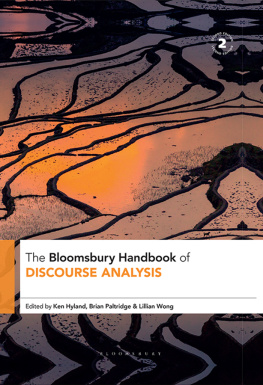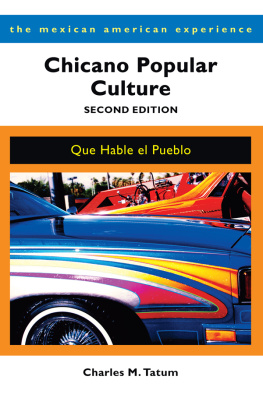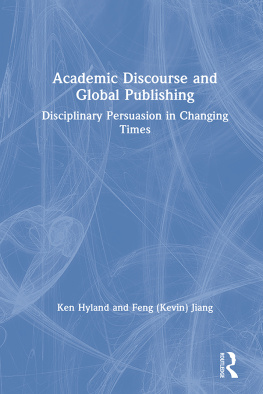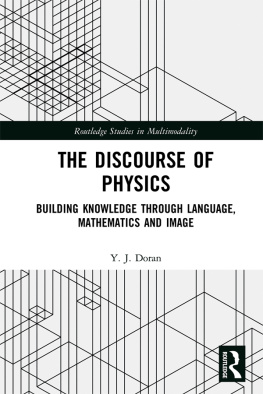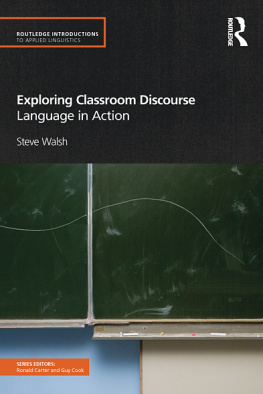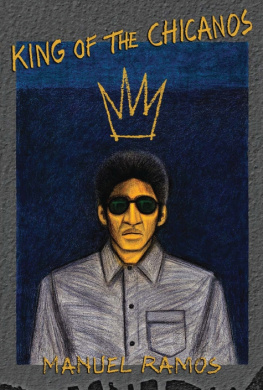Rosaura Sánchez - Chicano Discourse: Socio-Historic Perspectives
Here you can read online Rosaura Sánchez - Chicano Discourse: Socio-Historic Perspectives full text of the book (entire story) in english for free. Download pdf and epub, get meaning, cover and reviews about this ebook. year: 2017, publisher: Arte Público Press, genre: Politics. Description of the work, (preface) as well as reviews are available. Best literature library LitArk.com created for fans of good reading and offers a wide selection of genres:
Romance novel
Science fiction
Adventure
Detective
Science
History
Home and family
Prose
Art
Politics
Computer
Non-fiction
Religion
Business
Children
Humor
Choose a favorite category and find really read worthwhile books. Enjoy immersion in the world of imagination, feel the emotions of the characters or learn something new for yourself, make an fascinating discovery.

- Book:Chicano Discourse: Socio-Historic Perspectives
- Author:
- Publisher:Arte Público Press
- Genre:
- Year:2017
- Rating:4 / 5
- Favourites:Add to favourites
- Your mark:
- 80
- 1
- 2
- 3
- 4
- 5
Chicano Discourse: Socio-Historic Perspectives: summary, description and annotation
We offer to read an annotation, description, summary or preface (depends on what the author of the book "Chicano Discourse: Socio-Historic Perspectives" wrote himself). If you haven't found the necessary information about the book — write in the comments, we will try to find it.
This academic discourse on Chicanos formulates a framework to explain the relationship between verbal interaction and societal factors.
Chicano Discourse: Socio-Historic Perspectives — read online for free the complete book (whole text) full work
Below is the text of the book, divided by pages. System saving the place of the last page read, allows you to conveniently read the book "Chicano Discourse: Socio-Historic Perspectives" online for free, without having to search again every time where you left off. Put a bookmark, and you can go to the page where you finished reading at any time.
Font size:
Interval:
Bookmark:
Discourse
Socio-historic Perspectives
ROSAURA SNCHEZ

This book is made possible through support from the Lila Wallace-Readers Digest Fund and the Andrew W. Mellon Foundation.
Recovering the past, creating the future
Arte Pblico Press
University of Houston
Houston, Texas 77204-2090
Cover design by Mark Pin
Snchez, Rosaura
Chicano discourse : socio-historic perspective / by Rosaura Snchez.
p. cm.
Originally published: Rowley, MA : Newbury House Publishers, 1983.
ISBN 1-55885-117-8 (pbk.) : $15.95
1. BilingualismSouthwestern States. 2. Mexican AmericansLanguage 3. Spanish languageDialectsSouthwestern States. 4. Code switching (Linguistics)Southwestern States. I. Title.
P115.5.U5S26 1994
420.4261dc20 | 94-8662 |
The paper used in this publication meets the requirements of the American National Standard for Permanence of Paper for Printed Library Materials Z39.48-1984. 
Copyright 1983 by Rosaura Snchez
Previously published, 1983 by Newbury House Publishers, Inc.
Printed in the United States of America
To All Spanish Speaking Chicanos and Latinos
Almost fourteen years have passed since I completed the manuscript for this book which appeared finally in 1983. It goes without saying that since then, demographically, politically and economically much has taken place in this country and in the world. Since then too, I have come to know a good deal more about discourse analysis and Chicano history, and to understand a bit better the role of language in the construction of our knowledge about reality. And despite major political changes in the world since 1989, theoretically I am more convinced today than ever of the need to analyze language shift and language practices from a social and historical perspective.
The Southwest in the last fifteen years has changed dramatically. Already a multilingual and multi-ethnic region with millions speaking Spanish, Chinese, Tagalog, Korean, Japanese, Arabic, French, German, Italian, Farsi, Vietnamese, Portuguese, Laotian, and other European, Asian and East Indian languages, by the year 2030 this area of the U.S. will be markedly Latino. In fact, Latinos (mestizo, white and black), coming from all parts of Latin America but especially from Mexico and Central America, will be the largest minority population in this country by the end of the twenty-first century, and perhaps the majority population in states like California. If immigration trends are sustained, it is likely that about half of the future fifty-to-seventy million Latinos, scattered throughout the country but concentrated primarily in the Southwest, Florida, New York and the Midwest, will speak Spanish. Demography is of course only part of the picture; more significant in determining language maintenance or shift are economic and political divisions within the country and the socio-spatial distribution of Latinos segregated in large metropolitan working-class barrios and ghettoes, social sites plagued by socio-economic problems (unemployment, crime, drug-addiction and violence) but which serve as zones for the maintenance and nurturing of Spanish language varieties from a diversity of Latin American regions.
Economic pressures and Anglo-dominant control of political, economic and cultural spheres, on the other hand, will nevertheless continue to promote language shift and the loss of Spanish, especially among second and third generation Latinos, as is clear in current cultural production published primarily in English. But unlike areas like Ireland, where English saturation was not countered by a continuing influx of Gaelic speakers, odds are that bilingualism as a mass practice in the Southwest will survive, especially if the regions economic future is linked to Latin America and the Pacific Rim, as some economists predict. The very conditions stimulated by trans-national capital, dividing society along class and racial/ethnic lines, will in all probability lead to divisive ethnicisms but hopefully also to intra-ethnic and inter-ethnic alliances for the promotion of social change. In these future struggles, and given the growing Latino population, the Spanish language may come to assume a new historical role, one lost after 1846, a strategic cohesive role in the formation of Latino alliances and in the construction of collective identity. The widespread use of Spanish across the Southwest today, despite language loss among the younger generations, already points to a much more complex situation than that previously projected for immigrant communities in the United States.
At the level of theoretical framework, the first edition of Chicano Discourse clearly proposed a Marxist as well as semiotic and discursive analysis of language practices, a position by which I still stand today, as it has become even more clear that it is the interconnection of material conditions with political and cultural practices that determines the status and direction of linguistic practices, especially in the case of rapidly growing dis-empowered ethnic and linguistic minorities. Today, as always, specific discursive practices call for an examination of linguistic and interactional specificities, and for an analysis of all types of textsoral, written or any kind of signifying practiceas ideological (as Voloshinov pointed out so many years ago) and multi-discursive. In 1980 when I completed this manuscript, I had not yet discovered Bakhtin nor heard that he and Voloshinov were thought to be one and the same person. Whether in fact they are or are not, undoubtedly today I would follow Bakhtins direction as well and deal with all recorded texts as heteroglossic and dialogical and examine more closely the constructed and ultimately ideological nature of all notions of identity, including language loyalty.
At the historical level, from research on nineteenth-century Californios, I now know more about the effect of language discrimination upon a conquered Mexican population residing in the Southwest after 1846, its role in the denial of judicial rights and in the dispossession of Mexican landowners, and its strategic use in Spanish-language newspapers since the 1850s as a means of denouncing lynching, racism, dispossession and linguistic discrimination in the schools. If earlier in this century, Spanish language maintenance was not a dominant political issue for Chicano/Latino leaders favoring assimilation, we need to recall that by the 1960s bilingualism and bilingual education promoted by various Latino communities across the country would, in a perhaps less spectacular way than that of the civil rights movement, the anti-Vietnam war movement, the womens liberation movement and our own Chicano student movement, develop into an awareness-raising phenomenon, despite its status as a government-sponsored project to promote the education and linguistic assimilation of bilingual students across the land. Out of it came numerous Chicanos/Latinos trained as educators and community leaders; the continuing phenomenon of bilingualism itself moreover soon began to be seen as a threat to the mythic construct of the melting pot. When editorials appeared in major newspapers in this country inveighing against bilingual ecucation, it became clear that this educational reform measure was having unexpected repercussions and promoting ethnicism. For the moment at least, bilingualism emerged as an important strategic political practice around which Latinos could be empowered. The counter-organizing efforts of the English-only movement, like the nativist and anti-immigration hysteria of the 1990s, have since only served to affirm the political potential of efforts to maintain Spanish as a recognized
Font size:
Interval:
Bookmark:
Similar books «Chicano Discourse: Socio-Historic Perspectives»
Look at similar books to Chicano Discourse: Socio-Historic Perspectives. We have selected literature similar in name and meaning in the hope of providing readers with more options to find new, interesting, not yet read works.
Discussion, reviews of the book Chicano Discourse: Socio-Historic Perspectives and just readers' own opinions. Leave your comments, write what you think about the work, its meaning or the main characters. Specify what exactly you liked and what you didn't like, and why you think so.

